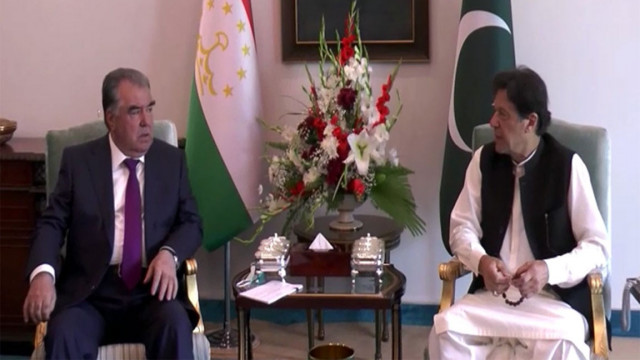Pakistan invites Tajikistan to avail CPEC facilities
PM Imran, President Rahmon voice concerns over Afghanistan slipping into civil war

Prime Minister Imran Khan on Wednesday invited Tajikistan to avail facilities of the Pakistan seaports and the China-Pakistan Economic Corridor (CPEC) during his talks with the visiting Tajik President, Emomali Rahmon.
At a joint news conference, the prime minister reiterated Pakistan’s support for Tajikistan’s membership of the Quadrilateral Traffic-in-Transit Agreement (QTTA). He also said that Pakistan was ready to sell arms to Tajikistan.
President Rahmon arrived on a two-day visit to Pakistan. He held a one-on-one meeting with the prime minister in which both sides reviewed the whole gamut of bilateral ties as well as discussed the regional and international issues.
According to the joint statement issued after the meeting, Prime Minister Imran informed the President Rahmon about the operationalisation of the Gwadar seaport and offered Tajikistan to avail the facility of Pakistani ports and CPEC.
Imran highlighted that Pakistani seaports offered the most efficient and economically viable route to central Asian countries, including Tajikistan. Imran told the news conference that enhancing trade ties had been on top of their agenda during the talks and added that Gwadar Port could help improve trade and commercial ties with Tajikistan.
The two sides also discussed cooperation in other fields, including defence. Imran said that Pakistan was ready to sell arms to Tajikistan as he mentioned a memorandum of understanding (MoU) for this purpose. However, he did not specifically mention any details of the arm sales.
President Rahmon offered to convene the joint working group to address issues of transit trade at the earliest and invite Afghanistan to participate in its meeting to boost trade and commerce with a view to engaging broader region in this process.Afghan situation.
Prime Minister Imran and President Rahmon voiced concerns over the danger of Afghanistan slipping into civil war after the US drawdown from the war-torn country, warning that such a scenario would be detrimental for both the countries.
Read more: Tajik president reaches Pakistan on two-day visit
“We both share concern that if there is no political settlement after the US withdrawal we fear Afghanistan may face the same situation as it had after the Soviet withdrawal,” the prime minister cautioned at a joint news conference with the Tajik president.
“This will not only affect our bilateral trade but also lead to terrorism,” Imran said.
Imran said he and the Tajik president shared this concern and believed that the only way to prevent chaos in Afghanistan was to have a political settlement. He also said that both countries decided to work with other countries to prevent chaos in Afghanistan.Joint statement.
According to the joint statement, while expressing satisfaction at the steadily growing relations between Pakistan and Tajikistan, the two leaders expressed their resolve to elevate bilateral ties to a new level of strategic cooperation for the mutual benefit of the two countries and their peoples.
The two leaders expressed satisfaction over the excellent bilateral cooperation at the multilateral fora, including the UN, OIC, ECO and SCO. They reiterated their commitment to further strengthen multilateral cooperation in the future for the global and regional peace and development.
The two leaders underscored the importance of regularly convening the meetings of Pakistan-Tajikistan Joint Commission on Trade, Economic and Scientific-Technical Cooperation to further strengthen bilateral trade and economic ties.
They emphasised the need for full implementation and regular follow-up on its decisions. It was agreed to hold the next session of the Inter-governmental commission later this year.
The two leaders noted with satisfaction the activities of multiple joint working groups (JWGs) constituted to further boost the already growing bilateral cooperation in various fields, particularly trade, investment, transport, energy, culture and tourism.
They highlighted the role of the Joint Business Council (JBC) constituted between the two countries to build direct business linkages and stressed the need for holding its meetings regularly by the chambers of commerce and private sectors. They also agreed to organise trade exhibitions and business fora on a regular basis with a view to boosting bilateral trade.
The two leaders noted with appreciation the progress achieved in the implementation of the flagship power project of Central Asia and South Asia (CASA)-1000 and reiterated their resolve to complete the project at the earliest.
They agreed that the materialisation of the project would establish energy connectivity leading to prosperity for all. They emphasised the need for tapping the vast potential that remained unexplored, particularly in the areas of trade, energy, connectivity, agriculture and industry for the mutual benefit.
The two leaders emphasised enhanced cooperation in education, culture and tourism through mutual development and joint ventures and highlighted the need for facilitating the people-to-people contacts.
Both sides underscored the importance of road, rail and air links between the two countries for promotion of bilateral as well as regional connectivity and resolved to improve the existing facilities and explore new options for improving rail, road and air connectivity.






1724319076-0/Untitled-design-(5)1724319076-0-208x130.webp)












COMMENTS
Comments are moderated and generally will be posted if they are on-topic and not abusive.
For more information, please see our Comments FAQ